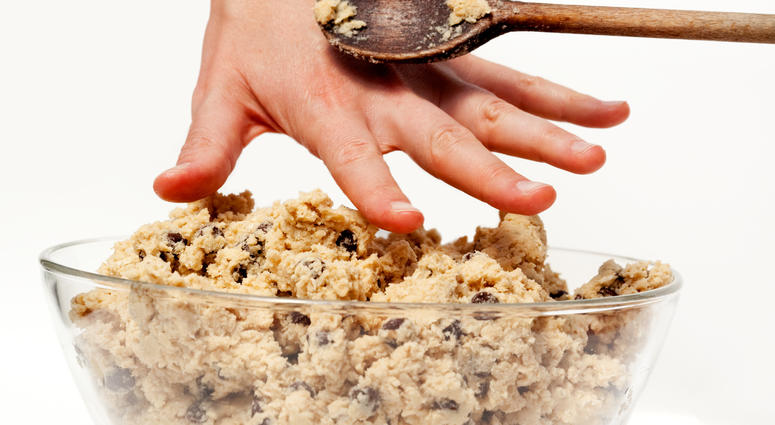Cake Mix Recall

Cake Mix Recall
Do not bake recalled Duncan Hines cake mixes, or eat cake or batter made with them. Return them to the store for a refund or throw them away. Find out how to identify the recalled mixes on the CDC Salmonella website.
There are many special occasions through the year that are perfect to spend time with loved ones while preparing delicious baked foods in the kitchen. Follow these safety tips to help you and your loved ones stay healthy when handling raw dough.
When you prepare homemade cookie dough, cake mixes, or even bread, you may be tempted to taste a bite before it is fully cooked. But steer clear of this temptation—eating or tasting unbaked products that are intended to be cooked, such as dough or batter, can make you sick. Children can get sick from handling or eating raw dough used for crafts or play clay, too.
Raw Dough Can Contain Bacteria That Cause Disease
Flour is typically a raw agricultural product. This means it hasn’t been treated to kill germs like Escherichia coli (E. coli). Harmful germs can contaminate grain while it’s still in the field or at other steps as flour is produced. The bacteria are killed when food made with flour is cooked. This is why you should never taste or eat raw dough or batter—whether made from recalled flour or any other flour. In 2016, an outbreak of E. coli infections linked to raw flour made 63 people sick. Flour products have long shelf lives and could be in people’s homes for a long time. If you have any recalled flour products in your home, throw them away.
In addition, raw eggs that are used to make raw dough or batter can contain a germ called Salmonella that can make you sick if the eggs are eaten raw or lightly cooked. Eggs are safe to eat when cooked and handled properly. Eating uncooked flour or raw eggs can make you sick. Don’t taste or eat raw dough!
Follow safe food handling practices when you are baking and cooking with flour and other raw ingredients:
- Do not taste or eat any raw dough or batter, whether for cookies, tortillas, pizza, biscuits, pancakes, or crafts made with raw flour, such as homemade play dough or holiday ornaments.
- Do not let children play with or eat raw dough, including dough for crafts.
- Bake or cook raw dough and batter, such as cookie dough and cake mix, before eating.
- Follow the recipe or package directions for cooking or baking at the proper temperature and for the specified time.
- Do not make milkshakes with products that contain raw flour, such as cake mix.
- Do not use raw, homemade cookie dough in ice cream.
- Cookie dough ice cream sold in stores contains dough that has been treated to kill harmful bacteria.
- Keep raw foods such as flour or eggs separate from ready-to eat-foods. Because flour is a powder, it can spread easily.
- Follow label directions to refrigerate products containing raw dough or eggs until they are cooked.
- Clean up thoroughly after handling flour, eggs, or raw dough:
- Wash your hands with running water and soap after handling flour, raw eggs, or any surfaces that they have touched.
- Wash bowls, utensils, countertops, and other surfaces with warm, soapy water.
Is recalled flour in your kitchen?
In 2016, a large outbreak of E. coli infections made people sick in 24 states. Disease detectives linked the illnesses to flour sold under several brand names, including Gold Medal, Gold Medal Wondra, and Signature Kitchens.
This flour, and baking mixes and other foods containing this flour, were recalled.
Check your pantry and throw away any recalled products.
If you stored flour in a container and no longer have the package, throw out the flour to be safe. Make sure that you clean your container with warm, soapy water before using it again.
Pay Close Attention to Any Symptoms
Food poisoning symptoms may range from mild to severe and may differ depending on the germ you swallowed. The symptoms of E. coli infections vary for each person but often include severe stomach cramps, diarrhea (often bloody), and vomiting.
People usually get sick 3 to 4 days after swallowing the germ. Most people recover within a week. However, some people develop a serious type of kidney failure called hemolytic uremic syndrome (HUS).
The symptoms of Salmonella infections typically appear 6 to 48 hours after eating a contaminated food, though this period is sometimes longer. Symptoms typically include diarrhea, fever, and abdominal cramps. In most cases, illness lasts 4 to 7 days and people recover without antibiotics. Illness from Salmonella bacteria can be serious and is more dangerous for older adults, infants, and people with weakened immune systems.
Source: https://www.cdc.gov/features/no-raw-dough/index.html
Yours in Service,
Rachel Huerta, ARNP
Owner of Direct Primary Care of Boca Raton
2017 Healthcare Woman of Distinction Award Winner
Immediate Past-President of The Rotary Club of Boca Raton
